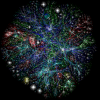network
-
Learning is in the network
“I knew them very well. That’s why it worked. Because we do work together.” We take responsibility for our own learning, yet keenly aware of the value for learning of engaging with others. It is when we find ourselves alone or isolated that we may best perceive the value of connecting with others for learning.…
Written by

-
What is a connector?
Where some believe that the value of their network is based on its exclusivity, connectors are people in the organization who have developed large networks of people and who see their role in introducing people in their network to each other. This connector role is closely related to the knowledge brokering process that recombines existing knowledge…
Written by

-
What does it mean to broker knowledge in a network?
Our network function requires that we interact with the network. We observe profound changes in the nature of knowledge, how it circulates, and this affects how we work (learn). Members in the network, too, have changed. We struggle to keep up with and adapt to these changes. In working with them, we prioritize results against…
Written by

-
How do we learn from the network?
When our organization’s hierarchy prohibits direct contact with the field, indirect and informal contact becomes more important than ever. Global and regional meetings, bilateral programmes, and various kinds of informal events provide opportunities for staying in touch. In fact, decentralization raises the stakes of informal and incidental learning – activities “flying under the radar” of…
Written by

-
Know-where
Six months after starting to develop LSi.io, I have 64 ongoing conversations with 150 interlocutors, connecting humanitarian and development learning leaders, Chief Learning Officers and academic researchers. Being independent has given me a unique vantage point from which to examine the humanitarian and development sector’s learning, education and training strategies. I believe that such perspective…
Written by
